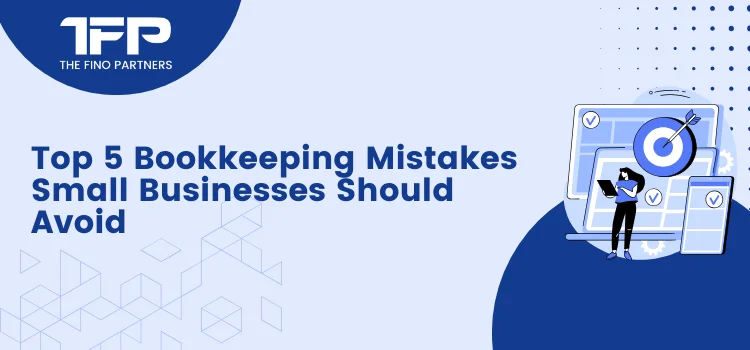Business bookkeeping tasks are essential in US small business. But it's so complex to do for business owners. Piles of paperwork and treatment of potential errors can add to big-time stress. However, by understanding and avoiding top bookkeeping mistakes, you can relieve this stress. There’s no reason your business’s bookkeeping records have to cause you stress. Some of the usual bookkeeping errors are easily fixed, while others require a more complex solution. This article discusses the top 5 bookkeeping mistakes in the US small business. It also explores how to solve the errors, too.
Bookkeeping
Bookkeeping is regular record-keeping of finance transactions. It includes tasks like recording sales, expenses, etc. Bookkeepers ensure all financial data. They are entered and categorized. Accounting builds on the basement of bookkeeping. Accountants analyze the recorded data. It also generates financial reports. After all, it identifies trends and interprets the economic health of the business.
Outsourcing Bookkeeping
Outsourcing bookkeeping is a practice in US small businesses. Outsourcing bookkeeping means hiring an individual to manage your books. It is better than having an in-house employee handle it. This approach can help small business owners save on maintaining a full-time employee. It can help companies save time, money, and resources while significantly improving their financial management. It gives owners control over their finances.
Bookkeeping Mistakes: Small Businesses Should Evade
Most bookkeeping errors are made due to a simple lack of time or understanding. However, you can minimize bookkeeping mistakes with the correct information and tools. Learning what to do–and what not to do–with your records can help ensure your US small business has a stable foundation. This knowledge empowers you to take control of your business's financial health.
1. Not Backing Up Your Books
Another of the most common bookkeeping mistakes is failing to back up your records. The last thing you want is to work hard at keeping good records and then have your data disappear without getting it back. By backing up your records, you can ensure the security of your financial data. The first step to adequately backing up records is to find and use a good accounting software program.
Solution: Most accounting software is cloud-based these days. If you use a cloud-based service, they will also keep up with your backups. But, if you are using anything housed directly on your computer system, you will need some kind of backup. Don't back it up onto the same hard drive where it stays. Save the backup file on an external hard drive.
2. Missing Out on Deductions
It's easy to take advantage of lesser-known deductions for your small business. For instance, working from home can deduct some of your housing costs from your small business tax return. Inventory, depreciation, and small business models can all affect taxes.
Generally, how you classify inventory can make a big difference in your year-end tax record. Thus, you need an accountant if your small business has inventory.
You may only know about some of the deductions you're entitled to as a business owner. But a good accountant can tell you. They can ensure you make the most of your money regarding inventory management.
Solution: Get a good accountant to help you navigate the IRS lingo for maximum deduction advantages and evade these top bookkeeping mistakes.
3. Procrastination
It's easy to neglect your bookkeeping responsibilities. Suppose you wait until year-end to start recording and organizing. It may cause tremendous stress and a lot of errors. Bookkeeping is so much easier when done in real time.
Solution: Record your revenue, expenses, income, payroll information, and other essential bookkeeping transactions every week. Set aside a designated time for weekly bookkeeping tasks and make it a habit. Soon, you'll push procrastination. That will ensure your business bookkeeping is easy.
4. Mixing Personal & Business Expenses
Separating your small business and personal accounts is essential in business. It clearly shows how the small business is financially sound. For example, If you spend your revenue on groceries and buying business supplies with your debit card. In such a scenario, you cannot know the profit and expenses of your small business.
Solution: Separating small business expenses from personal ones means having separate bank accounts for your small business. That way, there's no question about whether you made a business or an individual purchase. Income from the business goes straight into the business checking account. All expenses are paid from there. It makes it very clear whether your small business is making money.
5. Improper Classification
Not classifying your expenses in their proper place can lead to a lack of acknowledgement of small business health. To run a business properly, you need to know where the money is coming from and where it's going.
For example, you should have divided expense categories for business insurance to protect your small business and health insurance for your employees. This is because business insurance is a business operating expense. Likewise, health insurance for your employees counts as an employee benefit.
Solution: One fix is to hire an expert accountant to do the classification work for you. An accountant can help you organize your small business to ensure you operate categorically correctly. If that's outside the cards for you, consult an accountant to ensure you are doing things correctly and then follow their recommendations. Call and ask questions any time you are unsure.
Winding Up Remarks
Companies can maintain accurate bookkeeping. They keep it by avoiding top bookkeeping mistakes and implementing financial management practices. There are many essential steps to safeguarding the economic health of the small business. It involves regularly reviewing and reconciling financial data, implementing internal controls, and complying with tax regulations.
Fino Partners is a prominent outsourced bookkeeping and accounting business. It has a vast pool of accountants and CPAs to handle your small business bookkeeping aids effectively. You can streamline your accounting process, too, with us.
Read Also Common Bookkeeping Mistakes Small Businesses Should Avoid



























